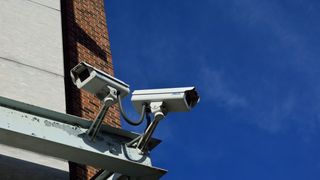AI security cameras inspired by frog eyes could be coming soon
The intelligent cameras would be much more efficient

University researchers are exploring ways to make security cameras more intelligent. The new approach would use artificial intelligence to create more efficient camera systems that only record high-level, relevant events taking place.
The research is part of a collaboration between the Universities of Manchester and Bristol that aims to improve existing methods employed by camera systems to process information.
Currently, visual sensors record everything before sending it to GPUs for processing, causing systems to become clogged with huge amounts of irrelevant data.
- The best security camera available today
- Check out our roundup of the best CCTV cameras on the market
- The best security camera system for your business
“To create efficient perceptual systems we need to push the boundaries beyond the ways we have been following so far,” Walterio Mayol-Cuevas, Professor in Robotics, Computer Vision and Mobile Systems at the University of Bristol, explained. “We can borrow inspiration from the way natural systems process the visual world — we do not perceive everything — our eyes and our brains work together to make sense of the world and in some cases, the eyes themselves do processing to help the brain reduce what is not relevant.”
The future of A-Eye
The two universities are exploring the use of Convolutional Neural Networks, a form of AI algorithm, to classifying thousands of visual frames per second, without having to record any of the images. The idea takes inspiration from a frog’s eye, which detects fly-like objects directly.
If the technology can be developed further, it could lead to a complete revamp of the security space, ushering in a future where AI cameras integrate the sensing, processing, and storage of visual data at the pixel level.
As well as taking cues from the natural world, the AI cameras also rely heavily on a new camera-processor chip called SCAMP. The chip has a processor embedded in every pixel, making it ideal for AI algorithms looking to rapidly assess visual data.
Are you a pro? Subscribe to our newsletter
Sign up to the TechRadar Pro newsletter to get all the top news, opinion, features and guidance your business needs to succeed!
- Also, check out the best DVR for your security camera
Via SciTech Daily
Barclay has been writing about technology for a decade, starting out as a freelancer with ITProPortal covering everything from London’s start-up scene to comparisons of the best cloud storage services. After that, he spent some time as the managing editor of an online outlet focusing on cloud computing, furthering his interest in virtualization, Big Data, and the Internet of Things.
Most Popular


